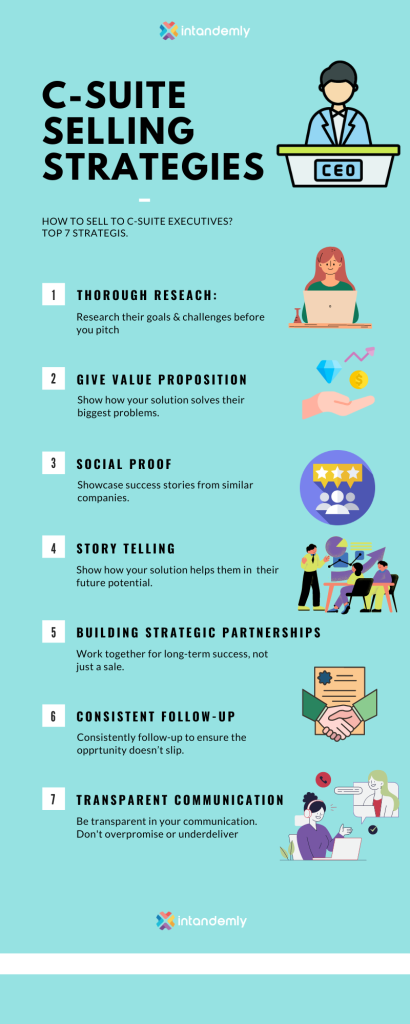C-Suite Selling: Effective Strategies to sell Top Executives in 2024
C-Suite Selling
C-Suite selling can be a complex and challenging task. It requires a deep understanding of the needs and priorities of these high-level decision-makers. In this blog post, we will explore the key tips on how to effectively sell to C suite executives.
The C-suite. It's a term synonymous with power, leadership, and the ultimate decision-making authority within a company. For salespeople, securing a meeting with a C-level executive can feel like winning the lottery. But the real challenge lies not in getting that initial handshake, but in crafting a compelling message that resonates with these busy, high-stakes individuals.
Understanding the C Suite
The C-suite refers to the highest level of executives within a company, including the CEO, CFO, CTO, and others. These individuals have the ultimate decision-making authority and are responsible for setting the strategic direction of the organization. The “C” in C-level means “chief,” and this includes titles like:
- CEO (Chief Executive Officer): Responsible for the overall vision and direction of the company.
- CFO (Chief Financial Officer): Overses the company's financial health and budgeting.
- COO (Chief Operating Officer): Ensures smooth day-to-day operations and achieving strategic goals.
- CMO (Chief Marketing Officer): Looks into for branding, and market growth.
- CTO (Chief Technology Officer): Leads the development and implementation of technology solutions.
Depending on the company's size and industry, there may be additional C-suite roles like CHRO (Chief Human Resources Officer) or CSO (Chief Sales Officer).
To successfully sell to the C-suite, it is essential to understand their priorities and concerns
C-suite executives are primarily concerned with driving business growth, increasing profitability, and ensuring a competitive advantage in the market. They are looking for solutions that align with their long-term goals and deliver measurable results. By demonstrating a deep understanding of their business challenges and offering innovative solutions, you can establish credibility and gain their attention.
Understanding C-Suite Priorities
C-suite executives are burdened with the weight of immense responsibility. Their concerns transcend everyday operational issues. Here's a glimpse into what truly matters to them:
While titles offer a basic framework, understanding the true motivations and priorities of C-suite executives is paramount to crafting a winning sales strategy. Here's a deeper dive into the key value drivers that influence their decisions:
- Growth: This is the lifeblood of any organization. C-suite executives are constantly seeking ways to expand their market share, increase revenue streams, and drive sustainable growth. They value solutions that can unlock new markets, improve customer acquisition, and fuel profitability.
- Competitive Advantage: Staying ahead of the curve is a constant battle in today's dynamic business landscape. C-level executives crave solutions that give them a competitive edge, whether it's through innovation, increased efficiency, or superior customer experiences.
- Shareholder Value: Publicly traded companies have an additional layer of responsibility – maximizing shareholder value. CEOs and CFOs are particularly attuned to the impact of their decisions on stock prices and investor confidence. Solutions that demonstrate a clear ROI, improved financial performance, and long-term value creation will be highly attractive.
- Innovation and Efficiency: In today's rapidly evolving marketplace, stagnation is a recipe for disaster. C-suite executives are keen to embrace innovative solutions that can streamline processes, automate tasks, and unlock new opportunities. They value solutions that can enhance their operations, fuel continuous improvement, and drive organizational agility.
- Profitability: Revenue growth is crucial, but it's meaningless without a healthy bottom line. C-level executives are acutely aware of the need to maximize profitability and shareholder value. Solutions that demonstrate a clear ROI, cost savings, and improved efficiency will resonate strongly with them.
- Risk Management and Sustainability: The C-suite doesn't shy away from calculated risks, but they prioritize safeguarding the company from potential threats and ensuring long-term sustainability. Solutions that address critical security concerns, mitigate compliance risks, or promote environmental responsibility will certainly pique their interest.
- Legacy Building: Beyond immediate results, many C-level executives are driven by a desire to leave a lasting legacy. Solutions that can help them achieve their long-term vision, transform the company's trajectory, or establish themselves as industry leaders will capture their imagination.
Identifying the Right C -Suite Executive
Identifying the right C-suite executive is the first step in your sales process. It's important to do your research and identify the individuals who have the authority to make decisions regarding your product or service. Conducting thorough research and leveraging your network can help you identify the right contacts within your target organization.
Once you have identified the C-suite executive, it's essential to understand their preferences, goals, and challenges. This will help you tailor your sales presentation to address their specific needs. It's also important to gather any relevant information on the company, its competitors, industry trends, and any recent news or developments that could affect the decision-making process.
C-Suite Selling Strategies
Now that you understand the who and the why, let's explore the strategic "how" of engaging with the C-suite.
1. Thorough Reseach:
Don't just research the company; research the individual C-level executive. Look for recent interviews, articles they've authored, or presentations they've delivered. Understanding their specific areas of focus and stated priorities will personalize your approach and demonstrate your genuine interest.
Familiarize yourself with current trends, challenges, and disruptive forces. This knowledge will allow you to position your solution as a timely and relevant answer to their industry-specific problems.Analyze their competitors. This will help you identify their potential vulnerabilities and tailor your message to highlight how your solution can provide a distinct advantage.
2. Give Value Proposition:
C-suite executives are results-oriented and need to see a clear return on their investment. Craft a compelling value proposition that highlights the unique benefits and outcomes your solution can deliver. Focus on the strategic impact and quantifiable results, such as increased revenue, cost savings, or improved efficiency.
Tailor your value proposition to the specific needs and goals of each executive. Understand their pain points and articulate how your solution can address them directly. Use data, case studies, and success stories to substantiate your claims and build credibility.
3. Social Proof:
Maximize the power of social proof to build credibility and trust with the C-suite. Gather all the testimonials from satisfied clients in similar industries to show your work and experinece. Showcase industry awards or recognitions your company has received. Highlight collaborations with reputable organizations. Demonstrate that your solutions have a proven track record of success in achieving desired outcomes.
4. Story telling:
Facts and figures are crucial, but weaving a compelling story can be truly persuasive. Frame your presentation as a narrative that outlines the problem, your solution as the answer, and the transformative impact it can deliver on their business.
Focus on the "Why": Don't just tell them what; tell them why. Explain why your solution matters in the context of their specific challenges and aspirations. Connect with them on an emotional level and inspire them to envision the positive future your offering can create.
5. Building Strategic Partnerships:
Demonstrate how your solution aligns seamlessly with their existing strategic initiatives. Show them how it can help them achieve their long-term goals and fulfill their vision for the company.
Don't be short-sighted. C-suite executives are looking for long-term partners, not one-time vendors. Develop a consultative approach that highlights your commitment to their ongoing success.
Don't just address their current pain points; anticipate their future needs. Demonstrate your understanding of evolving industry trends and how your solution can continue to provide value as their business grows and adapts.

6. Consistent Follow-up:
Schedule regular follow-up meetings to provide updates, address questions, and reiterate the value you bring. Offer relevant industry news, case studies, or thought leadership pieces that demonstrate your ongoing commitment to their success. By staying top-of-mind, you can ensure your solution remains at the forefront of their decision-making process.
C-suite decisions are rarely made overnight. Be prepared for a longer sales cycle compared to traditional B2B sales. Respect the time it takes for internal discussions, stakeholder buy-in, and budget approvals. Provide ongoing value throughout the sales cycle to maintain their interest and demonstrate your commitment to a successful partnership.
7. Transparent Communication:
Building trust is paramount in C-suite selling. Be transparent in your communication and readily address any concerns or questions they may have. Don't overpromise or underdeliver. Set realistic expectations and consistently exceed them. This fosters a sense of trust and reliability, making it easier for C-level executives to champion your solution within their teams.
Overcoming Common Objections from C-Suite Executives
C-suite executives are busy and discerning. They'll likely have concerns before committing to a new solution. Here's how to address common objections:
- "We don't have the budget." Be prepared to demonstrate the ROI (Return on Investment) of your solution. Show how it can save money, increase revenue, or improve efficiency, ultimately freeing up budget for other initiatives.
- "We're not ready for change." Highlight the potential risks of inaction. Explain how your solution can help them stay ahead of the curve and avoid being disrupted by competitors. Offer a pilot program to showcase the value proposition with minimal risk.
- "We need more information." Anticipate their questions and have in-depth answers readily available. Tailor presentations and resources to their specific needs and avoid overwhelming them with technical details.
- "We already have a vendor in place." Acknowledge their existing relationship, but highlight the unique benefits and competitive advantages your solution offers. Don't badmouth the competition; focus on the strengths of your own offering.
- "We need to discuss this internally." Respect their decision-making process. Offer to provide additional information or answer questions for other stakeholders involved. Stay persistent, but avoid being pushy.
Measuring Success in C-Suite Selling
To measure your success in C-suite selling, it is important to set clear objectives and track key performance indicators (KPIs). Some relevant metrics to consider include:
- Number of C-suite meetings secured: This reflects your ability to gain access to key decision-makers.
- Length of sales cycle: C-suite deals often take longer. Track the average time it takes to close a deal to understand your sales cycle velocity.
- Customer lifetime value (CLTV): Focus on building long-term partnerships. Measure the total revenue generated from a C-suite client over the course of your relationship.
- Net Promoter Score (NPS): This metric measures customer satisfaction and loyalty. A high NPS from C-suite executives indicates a strong partnership and potential for future business.
- Metrics aligned with C-suite priorities: Track the specific metrics that matter most to the C-suite, such as increased revenue, improved efficiency, or reduced risks.
Regularly evaluate your sales strategies and refine your approach based on feedback and results. Continuous learning and adaptation are essential in the ever-evolving landscape of C-suite selling.
CONCLUSION
C-suite selling is a valuable skill that can propel your career and drive business success. C-suite executives don't crave products, they crave strategic solutions that propel their business towards growth, profitability, and a competitive edge.
C-suite selling is not a one-size-fits-all approach. Each executive is unique, with their own set of goals and challenges. Adapt your strategies accordingly and continuously refine your approach. With persistence, expertise, and a customer-centric mindset, you can become a master C-suite selling and open new opportunities for growth and success.
